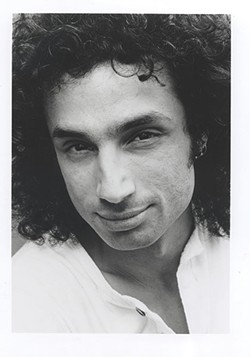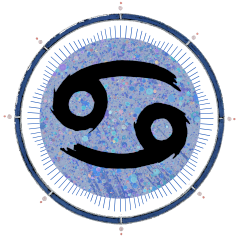By Anne Pyburn Craig | Link to original
He looks like the 1960s hippie Jerry Rubin, practices advocacy journalism with articles that carry headlines like “Another Fine Mess,” and has a hunger for government documents that rivals that of Seymour Hersh,” wrote Michael Winerip of Eric Francis Coppolino in the New York Times circa 1994. Eric’s horoscopes began appearing in Chronogram two years later, beginning a still-unbroken 20-year alliance.

Since we began together, his warm and lucid words have been translated into five languages. He’s official astrologer to the Omega Institute, lauded in the competitive world of British tabloid horoscopes, and founder/editor at Planet Waves, a project that Freehoroscopeastrology.com calls “one of the best sites on the Internet, period.” Or as happy subscribers put it, “I don’t how I lived without you all these years” and “You guys simply throw a wonderful party!”
Happy third decade, old friend. May our stars continue to rise—providential, instructive, and full of heart.
—Anne Pyburn Craig
It’s unusual for an astrologer to flatly state, as you do in Planet Waves’ terms of service, that “astrology is not the truth.” You describe astrology as an “analytical framework rather than as an exposition of objective reality.” Could you elaborate on that?
Astrology is interpretation. Let’s start there. People wonder why there are such considerable differences between the views of different horoscope writers, and that is why.
The simple, accurate explanation is that astrology is an interpretive art, just like any other — dance, painting, or photography, for example. In our society we have a faux definition of what is true, which is what’s supposedly proven by science. I think subjecting astrology to that standard, or pretending that it meets some scientific qualifications, is misleading.
We don’t need astrology to be objectively true in order for it to be meaningful. Poetry and music are interpretations, and they touch people deeply.
Soon after I was fluent enough in astrology to write about it, I started doing charts for news events. The structure of the astrological chart, in particular the houses and the longer planetary cycles, provides an excellent framework for asking questions and seeking understanding.
Combining research and reporting with astrology you can get a deeper sense of what’s developing than you might otherwise.
Planet Waves, your daily magazine, covers public affairs, offering astrology-infused takes on environmental, political, and gender issues. What’s your guiding philosophy in that area?
Over the 22 years I’ve been doing astrology, I’ve come to view it as a branch of environmental studies. Astrology is taking something that is usually invisible—one of Marshall McLuhan’s concepts of what an environment is—and making it apparent, and looking at it, and thinking about it. Astrology provides a view into the background, and in order to understand anything you must understand the context.

My viewpoint is that astrology must reflect society rather than making society somehow conform to astrological ideas. That was a natural progression given that I came to astrology having covered many facets of life as a journalist, photographer, and editor.
If you take a light touch and don’t get caught in dogma, astrology is marvelously adaptable. It’s truly a holistic art form. My choice to cover gender issues, ecological issues, and politics is about giving people something real to think about. The problem with most astrology is that it’s about astrology, and gets lost in its own sauce. I choose to write a narrative of astrology that’s about people and about the world.
You have a long resume as a facilitator in the polyamory and tantra movements, according to one description, helping people heal jealousy through self-love. In the 1990s, your Chronogram series on poly touched off quite a controversy. Almost two decades later, do you feel that polyamory is better understood?
Most people still don’t recognize the word polyamory, which means conscious, honest relationships that are not bound by monogamy. There is a word for that; it’s now in the Oxford English Dictionary.
Two decades after that somewhat infamous, rather simple series of articles, polyamory has been covered by every major media outlet. Seen that way, we were way ahead of the times, so to say.
Polyamory is better understood by some people—those who are curious. The block is that there’s still a huge gag reflex around jealousy, and people still invest nearly all of their self-esteem into whether this other person seems to care about them. If that is vaguely threatened, most people still have a meltdown. And most people are judgmental about what they perceive as promiscuity.
It takes courage to grant the people in your life the space to actually be themselves, which means giving them the space to love you, and to love as they want to love. This requires cultivating communication tools, and maturity, and I think those are the things we need to focus on now. There’s a lot more talk about being real and open than there is actually doing it, but we can change that if we want.
As I read your horoscopes, I see you advocating for authenticity on all levels. Would it be fair to call that the core value that runs through all of your work?
I am suspicious of the term authenticity, and it’s a word I rarely use. I’m just as suspicious of integrity as it’s currently used. In practice, both concepts are about seeming to be that thing rather than actually doing it, which defeats the point.
The difference is courage. When you’re being real, there’s that moment when your heart is pounding in your chest, and you know you’re taking a chance: an actual personal risk of some kind. That’s what I encourage people to do.



